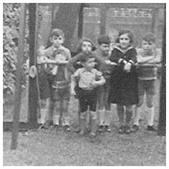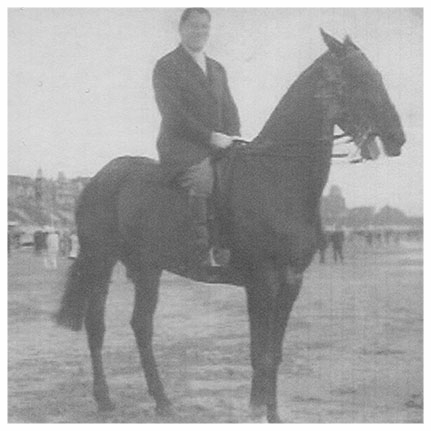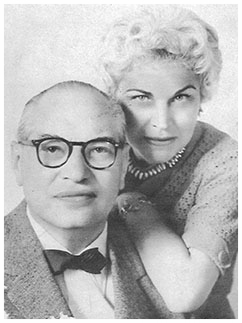Ralph Perlberger
Ralph's grandfather - Consul General of Rumania in Antwerp
May 9, 1940 - one day prior to the German invasion of the Netherlands, my father Oscar Perlberger‘s ship, that began its journey in Amsterdam, landed in NY, New York. He was far and distant from us. Helpless he could only watch and wait and hope as he was unable to take us out of Amsterdam or to return.
September, 1941 - my mother, Claire Perlberger-Untermans, my brothers Martin and Jacques and I, were taken prisoner in Amsterdam and sent to the Westerbork concentration camp in the South of the Netherlands. Train transports left every Wednesday for Eastern Europe extermination camps, and all efforts were geared to stay off those weekly transports, for as long as possible and, hopefully, until the Allies would come.
Post World War II statistics show that only 5% of those sent East from Westerbork survived the War.
Although incarcerated, one might consider us to have been among the lucky ones. On three occasions - between 1941 and 1943 - we were excused from boarding transports to extermination camps.
September 25, 1942 - my mother, brothers and I were scheduled to be sent to Auschwitz on a transport departing from Westerbork. Thanks to the intervention of a close family friend, we were saved. Dutch art dealer -Piet de Boer - persuaded (and bribed) the Secretary of the Italian Consulate, Dr. VItttorio Mugioli to call Herr Aus der Funten of the SD (the Sicherheitsdienst, the Nazi security service), to request a delay of the transport for our family, while he arranged to have us put on the Philips list.
Mungioli received 5,000 Dutch guilders from de Boer for his call. It was due to the involvement of Piet de Boer that 21 Jewish lives were spared, and we were subsequently kept off extermination camp transports for some period of time.
Our luck ran out.
January, 1944 - the Commandant of Westerbork, decided it was time for the four of us to board the next transport to Bergen-Belsen.
Again, it was a list that came to our rescue. By way of connection and influence, the Jewish Agency in London was able to get permission granted for our family to be on the Palestine Exchange Holland List.
Our lives were once and again spared. We presumed - wrongly - that we'd been rescued.
Alas, the list and the permit arrived either too late, or it was ineffective.
February 1, 1944 - the four of us were sent from Westerbork to Bergen-Belsen. There we were assigned to the “Sternlager” section, established in 1943 by the SS for “exchange Jews”, prisoners thought to be of some value. We kept our own clothes with their yellow Stars of David attached, We were not forced to wear the standard striped prison garb.
April 10, 1945 - approximately one week before liberation, the command of Bergen-Belsen decided to transfer the entire “Sternlager” section of inmates on three separate train transports in an effort to reach enemy lines and exchange our lives for German prisoners of war. My family was among 2500 prisoners who were put on the third transport that was eventually known as “The Lost Transport”, as it seemingly disappeared from the face of the earth. The two other transports were liberated by the American Army in Theresienstadt. Our train continued on, traveling farther and farther east in search of rail lines that had not been bombed out. We remained in German hands while the Holocaust in most of Europe had already ended.
Ralph with his mother, father and brothers - 2 years after emigrating to the United States
April 23, 1945 - those who survived our transport were liberated by the Russian army. We were re-settled in the tiny East German village of Troebitz. It took about 2 months before the Russians allowed us to be moved out. During that time I was given a bicycle and assigned the job of messenger, which afforded me free passage around the town. Somehow I had inadvertently done a favor for a Russian officer, and when he asked what he could do for me in exchange, I enlisted his help in stopping the Russians from stealing the bikes which I had stolen from the Germans.
Clare & Oscar Perlberger
June 1945 - still in Troebitz, I came down with typhoid fever and was hospitalized. Shortly thereafter we were told that the British would be transferring us to the Leipzig Repatriation Center in Germany. This departure was scheduled to occur while I was still in the hospital. We made a plan for my escape. Fortunately, and just in time for the transfer, I was discharged.
Eventually, the Dutch army brought us back to Amsterdam. In the autumn of 1945 my mother, brothers and I moved to Paris to seek U.S. entry visas, as the wait in Amsterdam was too long. After receiving the visa in Paris and finding ourselves on a long wati-list for a flight to New York, we moved to Portugal.
February, 1946 - the four of us finally arrived in New York and were miraculously reunited with my father.
* * *
Ralph Perlberger with his 4 grandchildren











